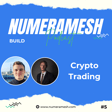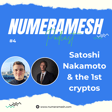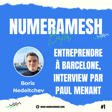
#6 - Julian Liniger: CEO @Relai, Entrepreneurial Insights, Navigating Intensity, Regularity, and Priorities on the Road to Success
We delve into his mindset and experiences, sharing valuable perspectives on the journey to success. We explore the principles that shape the entrepreneurial landscape.
Our conversation touches upon the concept that regularity beats intensity, highlighting the impact of consistent habits on long-term success.
Discover the power of identifying your priority project and the art of saying no to focus on what truly matters. We navigate through challenges such as scarcity of resources and the time-consuming nature of building a venture, providing insights into strategic approaches to overcome obstacles.
Our exploration extends to self-belief and self-care as fundamental concepts for entrepreneurs. We share anecdotes and reflections on the significance of maintaining confidence and well-being throughout the entrepreneurial journey.
Whether you're a seasoned business owner or just starting, this episode promises thought-provoking discussions and practical takeaways to fuel your entrepreneurial spirit.

















